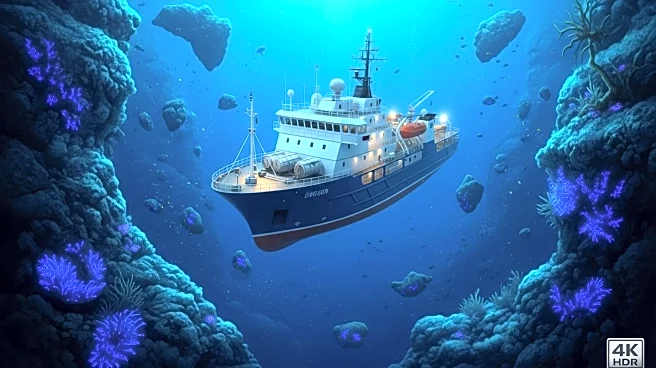What is the story about?
What's Happening?
The United Nations High Seas Treaty, known as the Biodiversity Beyond National Jurisdiction (BBNJ) agreement, is poised to become law following the endorsement of 60 countries. Scheduled to take effect on January 17, 2026, the treaty aims to designate at least 30% of international waters as protected marine areas. This initiative seeks to conserve ocean environments and halt nature loss by 2030. The treaty is a significant step in ocean conservation, as it addresses the unprotected status of high seas, which are crucial for biodiversity and climate regulation. However, conservation groups have raised concerns about the treaty's adequacy in protecting the deep sea from industrial activities like mining and bottom trawling.
Why It's Important?
The High Seas Treaty represents a monumental achievement in global ocean conservation efforts, potentially transforming two-thirds of the world's oceans that lie beyond national jurisdiction. By establishing protected marine areas, the treaty could significantly bolster biodiversity and climate regulation, benefiting fisheries and ocean ecosystems. However, the threat of deep-sea mining remains a critical issue, as it poses risks to vital ocean ecosystems. Conservation groups are advocating for additional measures, such as a moratorium on deep-sea mining, to ensure the treaty's effectiveness in safeguarding marine biodiversity.
What's Next?
The success of the High Seas Treaty will depend on its implementation and the commitment of countries to enforce its provisions. Conservation leaders emphasize the need for effective protected areas that safeguard biodiversity hotspots and enable endangered species to thrive. The treaty's implementation could lead to improved ocean health, securing food, jobs, and resilience for millions of people reliant on marine resources. Additionally, ongoing advocacy for a moratorium on deep-sea mining will be crucial in complementing the treaty's protections.
Beyond the Headlines
The High Seas Treaty highlights the ethical and environmental responsibilities of nations in managing shared ocean resources. It underscores the importance of international collaboration in addressing global environmental challenges. The treaty's success could set a precedent for future agreements aimed at protecting other critical ecosystems, fostering a culture of conservation and sustainable resource management.
















